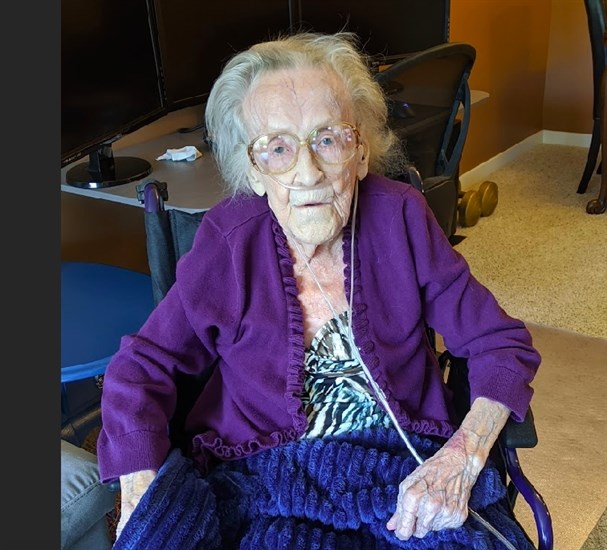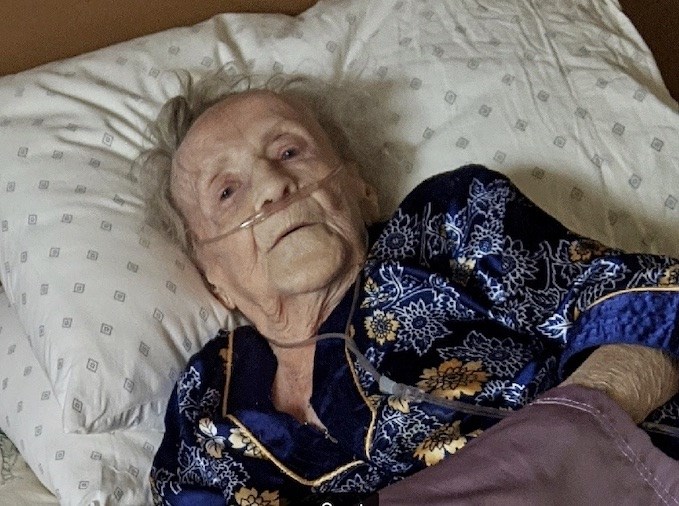
This is Terry on March 20, 2020, before her daughters were removed as essential visitors at her assisted living home.
Image Credit: Submitted/Bev Ambler
September 28, 2020 - 6:00 AM
The COVID-19 pandemic forced Bev Ambler to make a heart-rending choice – give up working with the dementia patients she adored or rescue her mother from possible starvation.
Of course, she chose her mother but it’s a choice she believes she shouldn’t have been forced to make.
“Even though the (Provincial Health Officer) said essential visitors (are allowed in care homes), pretty much every administrator said no visitors, as much as we can help, even if we have to mislead the families on the conditions (in the homes),” Ambler told iNFOnews.ca. “They’re so scared of getting COVID and being ‘THE’ facility that has COVID.”
Ambler, her son and her sister made the decision four years ago to put her mother, Terry, into an assisted living facility. While Ambler is fine with using her name, she asked that the facility not be identified.
She chose a new home for Terry that’s run by the same non-profit agency where she’s worked for 15 years as a long term care aid in the dementia ward.
That’s because she was happy with her employer and felt it was the best-run facility in the city.
Her faith in her employer has been shattered by what’s happened under COVID-19 rules, although things started out well.
“My sister and I were considered essential visitors right from the beginning of the lockdown because the administrator said my mom was quite frail, she needed help eating,” Ambler said.
Essential visitors have always been allowed into care facilities if residents need help with things like feeding themselves, communicating or disabilities.
“When the infections got worse and more widespread they locked down further,” Ambler said. “At that point we were informed that we were no longer allowed to be essential visitors.”
That was in early April.
“I talked to the administrator every week or twice a week because I would get calls from the staff saying your mother doesn’t want to have a shower, she doesn’t want to eat dinner, things like that,” she continued. “So I would phone the administrator and I would say, 'is mom doing OK?' She said, 'yep, mom’s doing good.'"
It wasn’t until Mother’s Day, May 11, that the truth came out when a care aide told Ambler’s sister that Terry was really not doing well and had not been for quite some time.
Ambler’s first move was to try to find out how much weight her mother had lost but that took a week of phone calls to finally get an answer.
Terry, who normally weighed just under 100 pounds had dropped to a mere 71 pounds just a few weeks after her family was prevented from feeding her.
“I lost it,” Ambler said. “I said I want to see her today.”
The administrator said she needed to get permission from corporate head office.
“I said you let corporate office know it’s not going to look very good if I go to the news, being a care aide of your company for 15 years, and I pull my mother out of your company because you can’t look after her properly,” was Ambler’s reply.
The idea of taking her mother home did not come out of the blue.
“When I was getting upset after I found out mom was 71 pounds one of her (administrator’s) comments – and this is very common for administrators to say this to families nowadays – was: “Well, you know, there’s always the option of taking them home.’”
That didn’t happen right away. Instead, Ambler and her sister were, once again, given essential visitor status on May 22.
When they walked in, Terry’s pants were literally falling off, she was “so skinny and so non-responsive.”

This is Terry after being taken to her daughter’s home in July.
Image Credit: Submitted/Bev Ambler
Within three weeks of daily visits and feeding, Terry had regained 13 pounds, was walking and talking again.
“In that entire month, the only thing I heard from administration was: ‘It’s natural decline,’”Ambler said. “My only comment was: ‘Why didn’t you tell me when I was phoning you that it was natural decline? At that point in time, I should have been an essential visitor.
“Every single care aide told me that they went to the administrator and said my mother is not eating, she’s depressed and she will not survive lockdown. At the same time I was phoning the administrator and being told my mother was fine.”
Despite the fact that Terry was regaining weight and strength, the administrator was pushing to have her relocated to residential (extended) care, or even palliative care.
Terry’s community care nurse saw her and said palliative care was definitely not needed but residential care was.
That was a dramatic change from November when Terry had been assessed to see if she was fit to live in her assisted living home for another year. Despite being 97 years old, she was given the green light.
But, after being locked down for a few weeks, she had deteriorated so badly mentally that she needed supervision. Unlike the weight loss, she’s not likely to recover mentally, Ambler said.
Knowing what she does about staffing levels in residential care homes, Ambler didn’t want to go that route. Neither did Terry.
“One of the times, once I was allowed to go back in and see mom, when mom started talking again, she kind of leaned into me and put her forehead on my forehead and looked right up at me with her tiny little blue eyes and said, 'I don’t want to die alone,'” Ambler said. “As soon as I came home and told my son that, the next day he had done up a budget and said this is how we can do it and we’re doing it.”
That meant taking a leave of absence from her job and making arrangements for her mother to live in their condo. She got nothing but praise from staff at both facilities for taking her mom home.
“I got so tired of hearing that that when the administrator said that to me the day I was moving mom out – I normally don’t get nasty with people but I actually turned on her and I said: ‘Really? I have to take a leave of absence from the job I absolutely love and the residents I absolutely adore to look after my mother at home, 24 hours a day with no break, because you couldn’t look after her properly and you lied to me about what her condition was. Ya, that’s great.'”
While, physically, Terry is much recovered, mentally she’s lost so much ground that she’s not likely to ever get it back.
“That’s one thing with mom, she’s always been a shit disturber all her life,” Ambler said. “She had that spark. She’s an empty shell now. Literally an empty shell that just grunts now. She doesn’t know how to express herself. I go mom, do you know you made that noise. She goes: ‘I can’t find words.’ This is a lady who had debates with me on Trump and politics just last year.”
Early in the COVID-19 lockdown another care aide told Ambler that she expected a lot of residents would end up on dementia wards as lockdowns went on.
“I really didn’t pay attention to that comment until the last few months when I had mom home,” Ambler said. “I can see that now, absolutely."
It’s not just Terry that Ambler is worried about, it’s the mental and physical impact on all long term and assisted care residents.
“This is why it’s so important to pay attention to seniors all the time,” she said. “You don’t just lock them away prison style. When they say seniors are locked away, they’re not just locked in their facility. They’ve been locked in their rooms, not coming out for activities. Not coming out for hairdressing, not coming out for church. Not coming out for anything. Their meals are delivered.”
But, more significantly, essential visitors could help so much with feeding and mentally stimulating residents.
“Every time something happens to a senior, it sets them back more,” Ambler said. “Even though they recover from it, it still sets them back.”
Her mother doesn’t even know how to pull the covers up so will call out in the night for Ambler to help.
“When you don’t do things for a long time, it’s hard to get that back,” she said. “We have locked them away, taken away any family support and not replaced any support whatsoever."
While Terry may have escaped the lockdown, that has been at a great cost to others.
“This has literally flipped my life completely upside down and her life and my family’s life,” Ambler said. “I know it’s happening to a lot of families out there. I took a leave of absence. I took her home. I can only be on leave for so long. She’s not dying anytime soon. Even at 97, she’s actually getting better. So now what?”
What comes next is unknown because there seems to be no one out there to help people like Ambler.
‘I shouldn’t have to do this,” she said. “We have care homes. When this first happened, I emailed the PHO office, the Minister of Health’s office, John Horgan’s office. I put in an official complaint with the assisted living registry. I phoned the ombudsman when I didn’t hear from anybody and he said you have to pick someone you want to hear from and we’ll get them to get back to you. I said the Minister of Health. That’s where this all falls under. This is important. Administrators are purposely keeping essential visitors out and this is wrong.”
She’s heard nothing back.
To contact a reporter for this story, email Rob Munro or call 250-808-0143 or email the editor. You can also submit photos, videos or news tips to the newsroom and be entered to win a monthly prize draw.
We welcome your comments and opinions on our stories but play nice. We won't censor or delete comments unless they contain off-topic statements or links, unnecessary vulgarity, false facts, spam or obviously fake profiles. If you have any concerns about what you see in comments, email the editor in the link above.
News from © iNFOnews, 2020